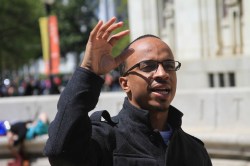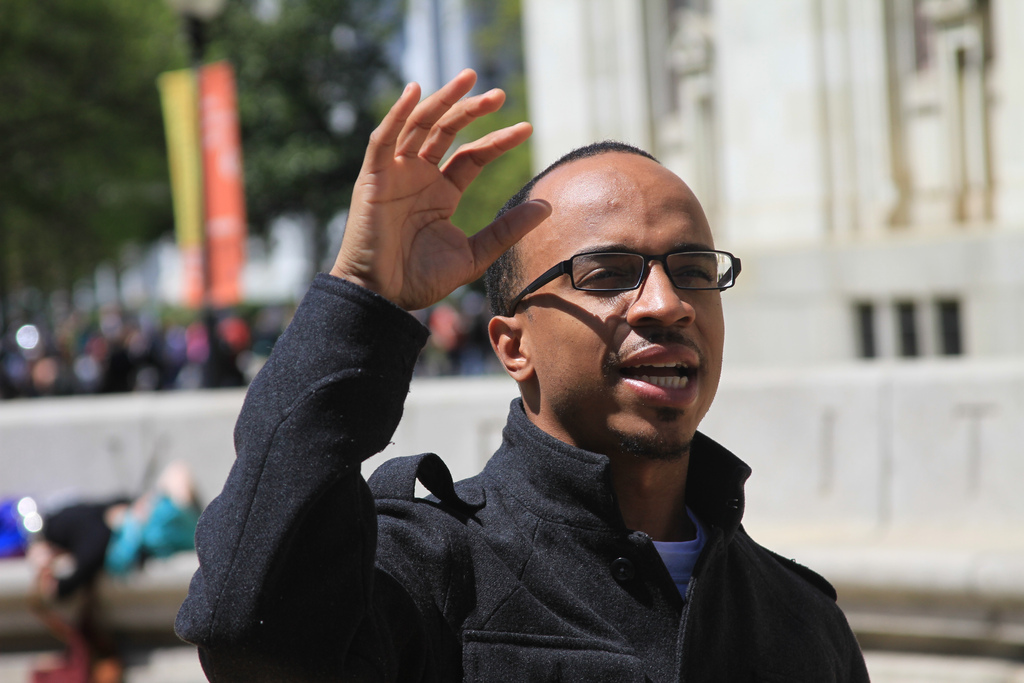 When Markese Bryant was growing up in Oakland, Calif., his schoolyard was next to a freeway. He shot hoops at a makeshift court where tattered nets hung from power line poles. His mother died when he was 5. His father was in prison. He was raised by his strictly religious grandmother.
When Markese Bryant was growing up in Oakland, Calif., his schoolyard was next to a freeway. He shot hoops at a makeshift court where tattered nets hung from power line poles. His mother died when he was 5. His father was in prison. He was raised by his strictly religious grandmother.
Then in 2005, at age 20, Bryant was arrested for selling crack cocaine. And that, he says, saved his life.
“The truth is, I had too much time on my hands and there were pressures,” he says. “I was coming of age where everyone around me expected me to take care of myself. If someone had come to me with a job or vocational school training, I would have done that. But at the time, none of those options came to me. At that time the option was to sell drugs.”
Jail made his choices clear: Become another black, male, drug-dealing statistic, or follow the rules, stay clean, stop dealing, and go back to school. After two years of passing drug tests and a year at junior college, Bryant was accepted to Atlanta’s Morehouse College, alma mater of Martin Luther King. And then his options multiplied.
He majored in African American studies, picked up Van Jones’s best-selling book, The Green Collar Economy, and had an epiphany: If the environmental movement is an extension of the civil rights movement, as Jones argues, why wasn’t environmentalism penetrating the campuses of Historically Black Colleges and Universities (HBCUs)?
“No one was talking about it from the leadership down to my level, so I decided to talk about it,” says Bryant, who started the on-campus group Green the Block. A longtime hip-hop musician, he wrote a song called the “Dream Reborn” and made a music video to go with it:
His fellow students dug it. They came to Green the Block’s workshops. They learned about global warming, environmental justice, and obesity. They saw — many for the first time — that they didn’t need to be white, wearing wool, and waving petitions to call themselves environmentalists.
“For a lot of African Americans or Latinos, going green or being environmentally conscious is a white thing, and that was one of the biggest challenges,” says Bryant. “That myth doesn’t encourage people to get involved with the movement.”
But a hip-hop concert and small workshops led by people who look like them? That was enough to get his fellow students talking about global warming.
“The students I was reaching are going to be leaders in the African American community,” says Bryant. “This culture — the African American one, hip-hop — is so robust that I knew if we could mesh their energy with the environmental movement, we could popularize the idea of sustainability.”
Bryant says his job was to convince the student leaders that they already knew about sustainability (their ancestors were hunters and foragers) and ecological awareness. Then he urged them to pursue environmental careers.
“The reality is, people of color are going to be the majority populations in this country,” he says. “How will the sustainability movement be sustainable if we don’t increase the numbers of people of color in the movement? That’s why HBCUs are important.”
In a behind-the-scenes video about his music, Bryant is more direct: “We need more cats from the hood to step into these positions. We are going to be locked out of this new economy just like we was locked out of the old economy.”
After graduating from Morehouse, Bryant worked for several years at the Oakland-based group Green for All before being awarded a “black male achievement” fellowship at Echoing Green, which provides start-up capital, technical assistance, and mentorship over 18 months to help fellows launch and build organizations.
Bryant, now 28, and fellow Morehouse graduate John Jordan, 23, are building an environmental program called Fight for Light. By offering a three-year stipend and student loan reduction at the fellowship’s completion, Fight for Light aims to cultivate the next generation of African American environmental leaders from HBCU campuses.
“Students are coming to HBCU campuses who don’t know about climate change or the greenhouse effect,” says Bryant. “It’s not that they’re not smart. It’s that no one has taught them about this. And as far as the jobs and opportunities go, students who are not exposed to these concepts and networks are not going to be in the game. At all.”
Green for All’s Julien Mocine-McQueen is confident Fight for Light will ultimately become a feeder organization for top environmental groups, policy centers, and schools.
“He’s been asking since he was a student, ‘how do we use the environmental movement to leverage opportunities?’” says Mocine-McQueen. “Markese is someone whose work is beyond him in the sense that others will adopt his methods.”
Asked about the President Obama’s commitment to the green economy, particularly since Jones stepped down from his post as the White House green jobs czar, Bryant replies, “When Van Jones resigned as a result of political pressures, it made me want to push back harder.
“I believe Obama has made the largest investment in green jobs of any U.S. president, but I don’t think he’s followed that up with enough leadership,” he says, adding, “if Obama wasn’t getting a lot of pushback from the GOP, we would be much further along.”



